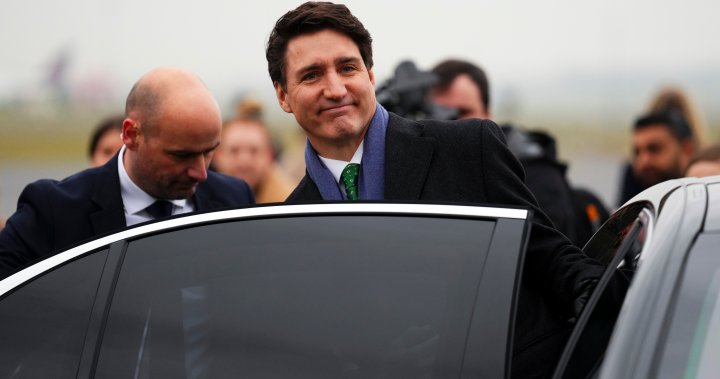Canada
Trudeau meeting NATO, EU leaders as U.S. tariff threat continues

Strengthening Canada-EU Relations: A New Era of Cooperation
Prime Minister Justin Trudeau’s visit to Brussels on Wednesday marks a significant step in Canada’s efforts to deepen its trade and defence ties with Europe. Arriving in the Belgian capital at around 10 a.m., Trudeau’s one-day itinerary includes high-stakes meetings with key European leaders, including NATO Secretary-General Jens Stoltenberg, European Commission President Ursula von der Leyen, and European Council President Antonio Costa. These discussions are set to shape the future of Canada-EU relations, particularly in light of growing economic and security challenges on the global stage. Trudeau’s visit also includes a press conference in the afternoon before he departs for Ottawa, signaling the importance of transparency and communication in these critical talks.
Economic Partnerships: A Foundation for Growth
Canada and Europe have been fostering stronger trade ties in recent years, and this visit aims to build on that momentum. Ottawa has already signed agreements to export hydrogen to Germany, a move that aligns with both nations’ commitments to combating climate change and transitioning to cleaner energy sources. Additionally, Canada has launched discussions with the EU to supply critical minerals, essential for the production of electric vehicles and other green technologies. These collaborations are not just about economic opportunity but also about reducing dependence on unstable or non-aligned partners.
The timing of Trudeau’s visit is particularly significant, as both Canada and Europe seek to navigate an increasingly uncertain relationship with the United States. U.S. President Donald Trump’s recent threats of punitive tariffs on Canadian goods, including a 10% tariff on energy exports and a 25% tariff on other imports, have raised concerns about economic stability. Although Trump has paused these tariffs until March 4, the unpredictability of U.S. policy has pushed Canada and Europe closer together. European leaders are similarly wary of Trump’s critiques of EU policies and his threats of tariffs on European goods, particularly targeting the automotive industry.
A United Front Against Trade Uncertainty
In response to these challenges, Trudeau has emphasized the importance of strengthening ties with Europe as a strategic buffer against U.S. trade policies. The Liberal government views increased trade with the EU as a key pillar in its approach to managing the unpredictable nature of Canada-U.S. relations. Since the provisional implementation of the Canada-EU Comprehensive Economic and Trade Agreement (CETA) in 2017, trade between Canada and EU countries has steadily increased, despite delays in full ratification by some member states, such as Belgium and France.
The visit also comes amid discussions about a potential defence and security pact between Canada and the EU. In January, the EU Council’s permanent representatives committee approved a proposal to negotiate a protocol for an EU-Canada security and defence partnership. This initiative reflects a broader shift in EU policy, as the bloc seeks to bolster its defence capabilities in the wake of Russia’s invasion of Ukraine in 2022. Brussels has already signed security agreements with non-EU countries like Japan and South Korea, focusing on areas such as naval cooperation, defence industry collaboration, and military logistics.
Security and Defence: A Growing Partnership
Canada’s role in these emerging EU security arrangements is already evident. Ottawa has provided military equipment to support Ukraine, leveraging existing defence agreements with the EU to facilitate the movement of supplies across European borders. Additionally, Canada has contributed personnel to EU defence missions, highlighting its commitment to transatlantic security cooperation. The potential for a formal EU-Canada security and defence partnership represents a significant deepening of this relationship, with implications for joint operations, intelligence sharing, and strategic planning.
Global Affairs Canada has been actively exploring this partnership, as evidenced by a briefing note sent to Foreign Affairs Minister Mélanie Joly in September. While the contents of the note remain confidential, the department emphasized that security and defence collaboration is a key pillar of the Canada-EU relationship. As the EU takes on a more active role in continental defence, leaders like French President Emmanuel Macron have championed the idea of a more self-reliant Europe, reducing its historical dependence on American military support.
Looking Ahead: Implications for Canada and the World
Trudeau’s visit to Brussels occurs on the eve of significant NATO and Ukraine Defence Contact Group meetings, underscoring the interconnected nature of global security challenges. As Canada and Europe work together to address these issues, their collaboration sends a powerful message about the importance of multilateralism and shared values in an increasingly uncertain world. Whether through trade, defence, or green energy initiatives, the Canada-EU partnership is poised to play a pivotal role in shaping the future of international relations.
In summary, Prime Minister Trudeau’s visit to Brussels is more than just a diplomatic stopover—it represents a strategic effort to strengthen Canada’s ties with Europe at a time of global turbulence. By deepening economic, trade, and defence partnerships, Canada and the EU are not only securing their mutual interests but also reinforcing the principles of cooperation and solidarity that underpin their relationship. As the world navigates unprecedented challenges, this visit highlights the enduring importance of collaboration between like-minded nations.











